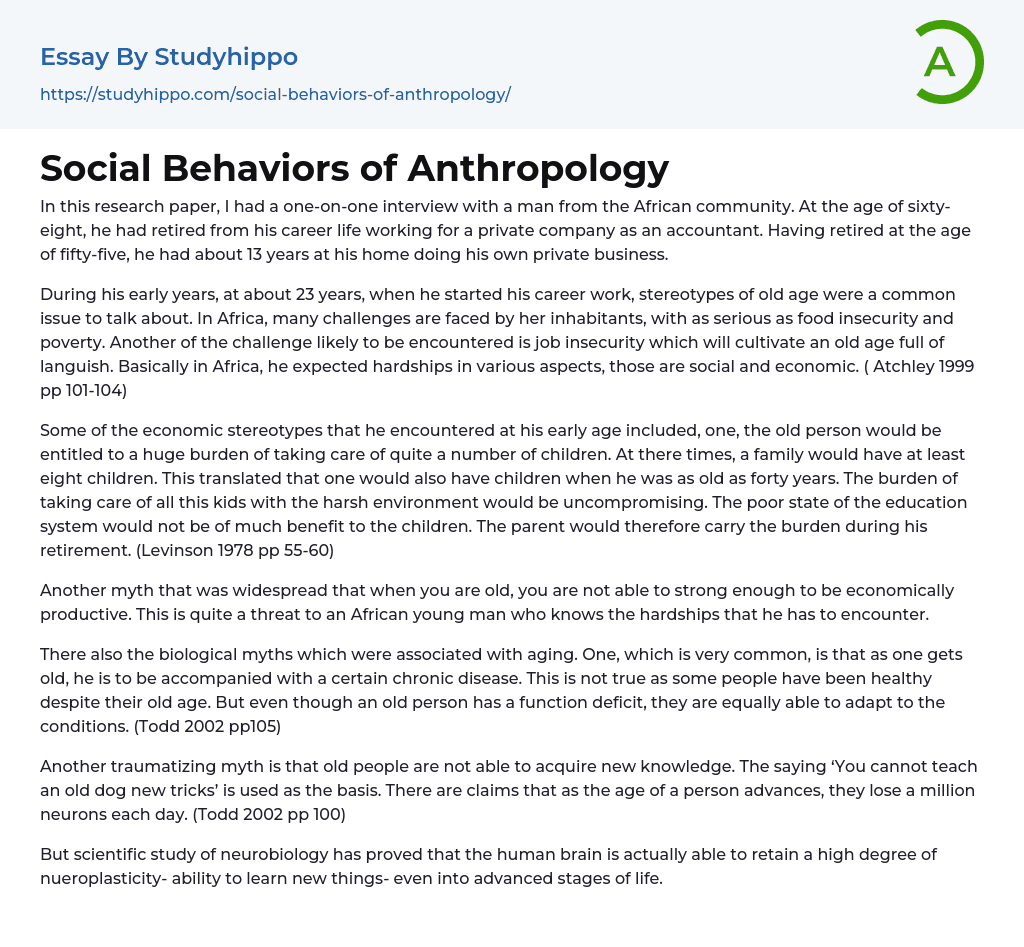During my research, I interviewed a retired man from the African community who worked as an accountant for a private company until he turned sixty-eight. Before retiring, he ran his own business from home for thirteen years. Throughout his career, which started at twenty-three, he encountered stereotypes about old age that were commonly discussed in Africa. The African community faces numerous challenges such as food insecurity, poverty, and job insecurity, all of which contribute to difficulties in old age.
Economic stereotypes include the belief that older individuals will have to take care of multiple children in large families and often have their own children when they turn forty. Additionally, due to the poor state of the education system, parents are responsible for taking care of their children during retirement because they don't receive much assistance. Another prevailing myth is that older individuals ar
...e not economically productive due to physical weakness (Atchley 1999 pp 101-104) (Levinson 1978 pp 55-60).
African youth face significant threats posed by various challenges and are well aware of the hardships they will have to endure. One particular challenge is the prevalence of age-related biological myths.Contrary to the belief that aging makes people more susceptible to chronic illnesses, research in neurobiology has shown that the human brain can still change and adapt as individuals age. Elderly individuals can defy negative stereotypes by making wise decisions early on, such as planning for financial security and investing in profitable programs. Having a supportive family also plays a significant role in their success. Adopting healthy behaviors like quitting smoking and avoiding heavy alcohol consumption is crucial for maintaining good physical health and remaining economically productive.
Despite using a
walking stick typically used by older adults, the respondent remained healthy with an upright posture. The only noticeable deficit was poor eyesight, which required wearing spectacles. To manage his health, he followed a special diet recommended by a nutritionist that included African indigenous foods and avoided fatty meat. He also prioritized exercise and often chose to walk instead of using transportation (Nancy 2001 pp 34-37). The respondent mentioned having no drug addictions but did mention colleagues who have passed away or currently suffer from chronic diseases like cancer or high blood pressure.He has acquired effective strategies for managing stress, such as anger and temper control and avoiding stressful situations. In terms of psychological aspects, he demonstrated an impressive ability to recall information and provide relevant insights that surpass even those of sharp young individuals. There were no apparent signs of cognitive decline as he consistently answered all questions. It is evident that personal choices have a significant impact on the aging experience rather than innate factors. The respondent specifically discussed his African family, emphasizing the importance placed on moral behavior in African culture. Adherence to strict moral standards is crucial for acceptance and respect within society. Practices considered deviant in other communities are deemed inappropriate within his community. Conforming to appropriate behavior is essential for gaining acceptance in African society, as highlighted by Kluckholn (1953 pp.342-357). The interview focused on valued personality traits and relationship dynamics in African culture where obedience to parents and elders is seen as a fundamental indicator of one's moral character. A strong work ethic holds high regard with prevalent manual labor while active participation in family life is also considered
important. Respecting and upholding family unity is paramount within the African community according to Kluckhohn (1953 pp.342-357).The unity of a family is crucial for societal development as individuals rely on their families for support. In African societies, the family represents the fundamental unit of unity, with each member having specific roles and responsibilities. Traditionally, fathers provided basic needs, but now women also contribute. It is important that every family member fulfills their designated responsibilities.
In African societies, the concept of family extends beyond nuclear relationships to include grandparents, uncles, aunties, and sometimes even great-grandparents. The extended family structure is essential as the nuclear family alone cannot be self-sufficient. Effective communication among members is crucial to maintain unity within a large family. Regular meetings are organized to address issues and find solutions while creating a celebratory atmosphere to cherish the bond.
Unity in African societies also results in communal responsibilities during various occasions throughout the African calendar.In African communities, the responsibility of giving a dignified farewell to a deceased family member falls upon all relatives. Similarly, if a parent is unable to afford their child's education, it becomes the duty of the entire family to ensure that the child attends school. Despite a decrease in communal values, individuality is not prominent in African communities as people continue to support each other in every aspect of life.
- Population essays
- Cultural Assimilation essays
- Demography essays
- Ethnographic essays
- Population Growth essays
- Perseverance essays
- Expressive essays
- Character Traits essays
- Apology essays
- Compassion essays
- Anatomy and Physiology essays
- Addiction essays
- Biodegradation essays
- Dental Care essays
- Disease essays
- Disorders essays
- Health Care essays
- Intelligence Quotient essays
- Nutrition essays
- Olfaction essays
- Public Health essays
- Women's Health essays
- World health organization essays
- Cancer essays
- Infectious Disease essays
- Lung Cancer essays
- Neurology essays
- Physical Exercise essays
- Medicine essays
- Sex essays
- Inquiry essays
- Disability essays
- Poison essays
- Action Potential essays
- Nervous System essays
- Childbirth essays
- Puberty essays
- Blood essays
- Kidney essays
- Neuron essays
- Body essays
- Glucose essays
- Sense essays
- Heart essays
- Skeleton essays
- Human Physiology essays
- Eye essays
- Immune System essays
- Muscle essays
- Skin essays




